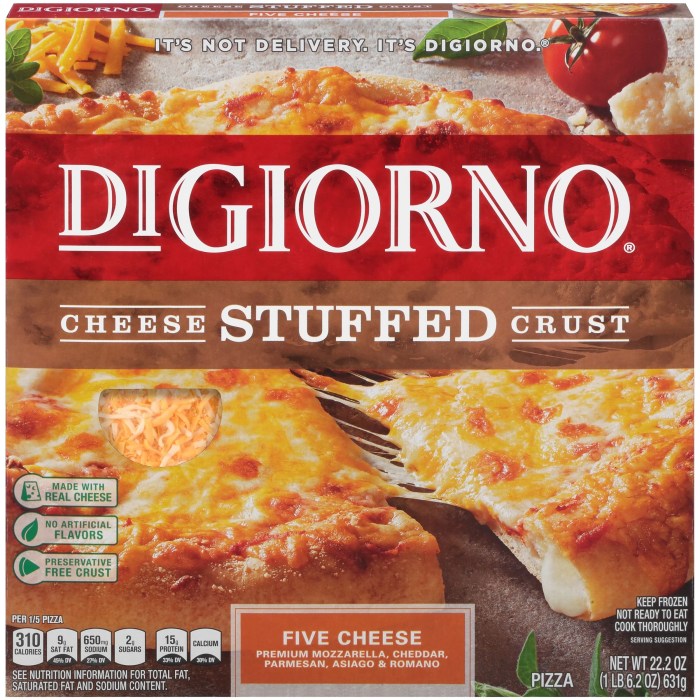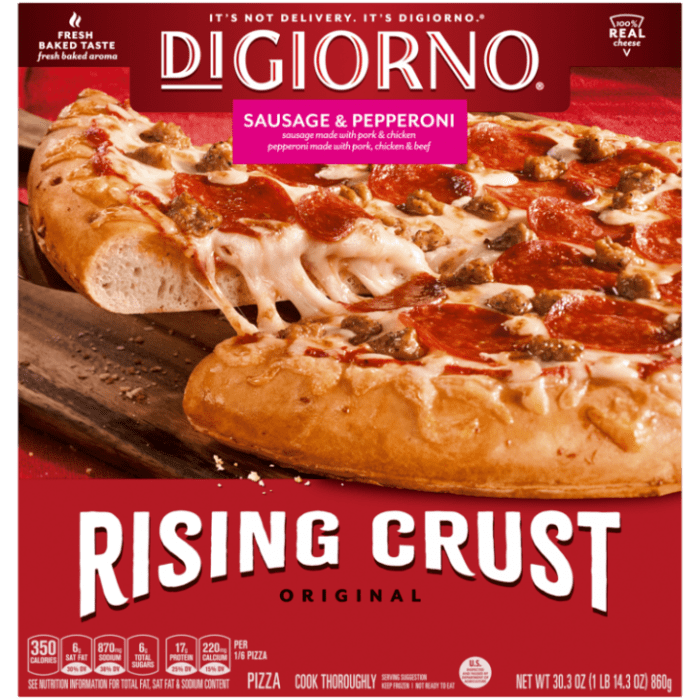Ingredient Analysis

Digiorno cheese pizza nutrition facts – Let us embark on a journey of mindful consumption, examining the components of Digiorno cheese pizza and their effects on our well-being. Understanding the ingredients empowers us to make conscious choices, aligning our dietary habits with our spiritual journey of self-care and awareness.The primary ingredients of Digiorno cheese pizza are a blend of enriched flour, water, tomato paste, cheese (typically mozzarella), and various seasonings.
While the nutritional profile of Digiorno cheese pizza might leave one yearning for a healthier alternative (or at least a different flavor profile), let’s not forget the delightful, albeit potentially caloric, journey of cheese. For those seeking a comparison, consider exploring the nutritional details of another cheesy delight, by checking out the comprehensive guide on gouda cheese nutrition facts , before returning to your careful consideration of that Digiorno’s nutritional information.
Perhaps a Gouda-inspired pizza topping is in order?
These seemingly simple ingredients, however, contribute to a complex nutritional profile with both beneficial and detrimental aspects.
Nutritional Contributions of Main Ingredients
Enriched flour provides carbohydrates for energy, a vital fuel for our daily activities. However, excessive refined carbohydrate intake can lead to blood sugar imbalances. Water, essential for life, is a fundamental component of the pizza dough, contributing to its texture and moisture content. Tomato paste offers lycopene, a powerful antioxidant associated with reduced risk of certain diseases. Mozzarella cheese is a source of protein and calcium, crucial for building and maintaining strong bones and muscles.
However, cheese is also relatively high in saturated fat, which should be consumed in moderation as part of a balanced diet. The various seasonings add flavor and can contribute small amounts of vitamins and minerals, but their impact is usually minimal compared to the major ingredients.
Potential Health Impacts of Ingredients
The positive health impacts of Digiorno cheese pizza are primarily derived from the lycopene in the tomato paste and the calcium and protein in the cheese. Lycopene acts as a potent antioxidant, fighting free radicals that can damage cells and contribute to aging and disease. Calcium and protein are essential for maintaining healthy bones and muscles. However, the negative health impacts are more pronounced.
The high levels of saturated fat and refined carbohydrates can contribute to weight gain, high cholesterol, and increased risk of heart disease and type 2 diabetes if consumed regularly and excessively. The sodium content is also typically high, which can contribute to high blood pressure in susceptible individuals.
Added Sugars, Artificial Flavors, and Preservatives
Many processed foods, including frozen pizzas like Digiorno, often contain added sugars, artificial flavors, and preservatives to enhance taste, extend shelf life, and improve texture. While the specific amounts and types of these additives vary depending on the particular Digiorno pizza variety, their presence should be acknowledged. Added sugars contribute to empty calories and can negatively impact blood sugar control and overall health.
Artificial flavors and preservatives, while generally considered safe within regulatory limits, raise concerns for some individuals regarding potential long-term health effects and preference for natural alternatives. Consumers should carefully review the ingredient list on the product packaging to make informed decisions aligned with their personal health goals and values.
Potential Health Concerns

Regular consumption of Digiorno cheese pizza, like many processed foods, presents potential health risks if not enjoyed mindfully. Understanding these risks empowers us to make conscious choices that align with our overall well-being, fostering a harmonious relationship between our desires and our health. This is not about deprivation, but about mindful engagement with our food.High sodium, saturated fat, and carbohydrate content are the primary concerns associated with frequent Digiorno pizza consumption.
These macronutrients, while necessary for life, can contribute to various health problems when consumed in excess. Let’s explore these risks and discover how we can navigate them with wisdom and balance.
High Sodium Intake Risks
Excessive sodium intake is linked to high blood pressure (hypertension), a major risk factor for heart disease and stroke. The sodium in processed foods like pizza can significantly contribute to exceeding recommended daily limits. For example, a single serving of Digiorno pizza may contain a substantial portion of the recommended daily sodium intake, meaning several slices could easily lead to exceeding the limit.
This can lead to water retention, increased strain on the heart, and damage to blood vessels over time. Mindful consumption involves being aware of the sodium content and adjusting portion sizes accordingly.
High Saturated Fat Intake Risks
Saturated fats, found in cheese and processed meats often included in pizza, contribute to elevated cholesterol levels. High cholesterol increases the risk of heart disease and other cardiovascular problems. While some saturated fat is necessary, excessive intake can lead to the buildup of plaque in arteries, narrowing them and reducing blood flow. This can manifest as chest pain (angina), shortness of breath, and ultimately, heart attack or stroke.
Choosing leaner protein options and limiting pizza frequency can mitigate this risk.
High Carbohydrate Intake Risks, Digiorno cheese pizza nutrition facts
While carbohydrates provide energy, excessive intake, particularly from refined carbohydrates like pizza dough, can lead to weight gain and increased risk of type 2 diabetes. Refined carbohydrates are quickly digested and absorbed, leading to spikes in blood sugar levels. Over time, this can overwhelm the body’s ability to regulate blood sugar, increasing the risk of insulin resistance and ultimately, type 2 diabetes.
Focusing on whole-grain alternatives and controlling portion sizes are key strategies to minimize this risk. Consider incorporating more vegetables and fiber into your diet to balance carbohydrate intake and promote healthy digestion.
Recommendations for Mindful Consumption
Mindful eating is a spiritual practice; it’s about connecting with your food and your body. It’s not about restriction, but about conscious choice. Enjoy your Digiorno pizza occasionally, savoring each bite, rather than consuming it mindlessly. Consider sharing a pizza with others to control portion sizes. Balance your meal with plenty of vegetables and fruits, and choose healthier alternatives on other days.
Listen to your body’s signals; if you feel full, stop eating. This mindful approach helps us honor both our cravings and our well-being.
FAQ Corner: Digiorno Cheese Pizza Nutrition Facts
Is Digiorno cheese pizza vegetarian?
Yes, the standard Digiorno cheese pizza is typically vegetarian, but always check the ingredient list for potential cross-contamination.
Can I microwave Digiorno pizza?
While not ideal for optimal taste and texture, you can microwave Digiorno pizza. Check the box for specific instructions.
How much sodium is in a Digiorno cheese pizza?
The sodium content varies depending on the size and type of Digiorno pizza. Check the nutrition label for the specific amount.
Does Digiorno use artificial flavors?
Check the ingredient list on the packaging; many frozen pizzas do contain artificial flavors and preservatives.



